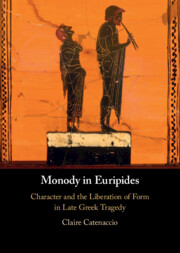Book contents
- Monody in Euripides
- Monody in Euripides
- Copyright page
- Dedication
- Contents
- Acknowledgments
- Note on Editions and Translations
- Introduction
- 1 Ion
- 2 Iphigenia among the Taurians
- 3 Phoenician Women
- 4 Orestes
- Conclusion
- Appendix Actor’s Song in the Extant Plays of Aeschylus, Sophocles, and Euripides
- References
- Index
Conclusion
Freedom and Form
Published online by Cambridge University Press: 27 July 2023
- Monody in Euripides
- Monody in Euripides
- Copyright page
- Dedication
- Contents
- Acknowledgments
- Note on Editions and Translations
- Introduction
- 1 Ion
- 2 Iphigenia among the Taurians
- 3 Phoenician Women
- 4 Orestes
- Conclusion
- Appendix Actor’s Song in the Extant Plays of Aeschylus, Sophocles, and Euripides
- References
- Index
Summary
Monody is an essential part of Euripides’ mature dramatic art. All the surviving examples of actor’s lyric by Aeschylus and Sophocles are songs of lamentation, where the use of solo song emphasizes the relationship between the isolated singer and the larger group. Reacting against this tradition, in his late plays Euripides reconfigures monody by blending it with the other traditional forms of Greek tragedy, such as the agon, rhesis, choral ode, and messenger speech. These reconfigurations, or “liberations,” are signaled so that attention is drawn in each case to the poet’s ingenuity. In addition to this formal innovation, Euripides uses monody as a vehicle to express emotion and develop character on the tragic stage.
- Type
- Chapter
- Information
- Monody in EuripidesCharacter and the Liberation of Form in Late Greek Tragedy, pp. 187 - 189Publisher: Cambridge University PressPrint publication year: 2023

